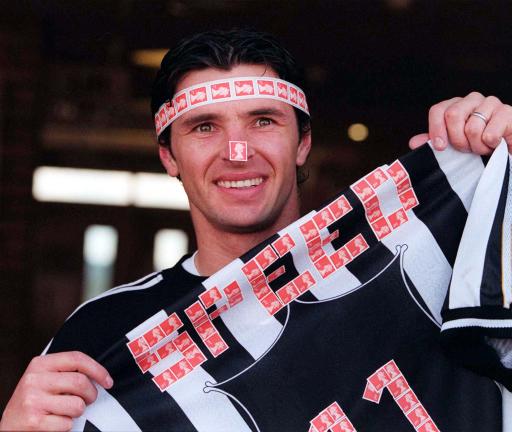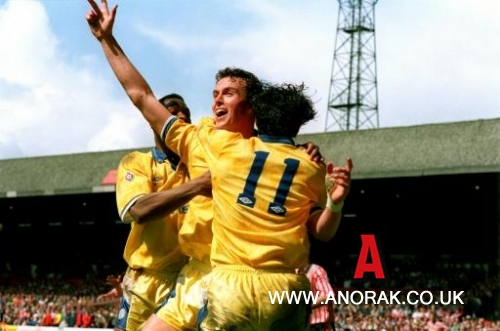Tabloids And Twitter Wallow In The Death Of Gary Speed: It’s Not All About Football
 HOW do you report on the apparent suicide of Wales manager Gary Speed, dead at 42? His wife found him hanged at their home in Huntingdon Hall, near Chester.
HOW do you report on the apparent suicide of Wales manager Gary Speed, dead at 42? His wife found him hanged at their home in Huntingdon Hall, near Chester.
The Mail opts for the investigation into a private life. Gary Speed’s nearest and dearest are now considered fair game. The front-page picture is of Speed and his wife Louise, mother to his two children. The headline states:
“Suicide mystery of Gary Speed”
Indeed, it is a mystery. Trying to make sense of a man’s suicide is an imposisble job for those who have never contemplated it nor know nothing of the workings of the man’s mind and private life.
The Times also want to know why. It’s front-page headline says:
“MYSTERY OVER MANAGER”S DEATH’
Simon Barnes tells us:
To regular viewers who tuned into the BBC’s Football Focus on Saturday there was nothing obviously wrong with the young international manager lauded for reversing his team’s ailing fortunes. But hours later, Gary Speed committed suicide in the garage of his £2 million home.
A sporting idol and adoring father of two boys, Ed aged 14 and Tommy, 13, he left fans and fellow professionals asking “why?”.
It may be a case of now ‘why?’ but ‘why not?’ – why not earlier? Why now?
To Barnes football lies at the heart of the man’s death. But he offers no evidence that it did. It’s just assumed that even in death the public figure must always remain relevant to the root of his power and fame. It serves only to show how little any of us knew the man.
The Wales manager, who at 42 had won a host of plaudits for leading the team more than 70 places up the international rankings, was discovered by his wife, Louise, just after 7am yesterday.
Seems like 70 places up the Fifa rankings was not enough. The £2million home was not enough.
Matthew Syed, also in the Times, writes under the headline:
Beautiful game’s dark side takes another life
Do more footballers commit suicide than those in other walks of life? No. There is no evidence that they do.
Speed was just a man whose talents thrust him into the public eye. And we do so like to think we know our heroes. Says Syed:
Gary Speed was living the dream and then some.
No. He was not, evidently. He was living our dream. His life was less than perfect, if it was suicide.
Syed then speaks of suicides in sport, mentioning Robert Enke – the 32-year-old German goalkeeper jumped in front of an express train – and Tim Carter, “the former Sunderland goalkeeper, who hanged himself in 2008, and Dale Roberts, a goalkeeper with Rushden and Diamonds, who hanged himself last year.”
No mention of Justin Fashanu, the first professional footballer in Britain to openly “come out” and admit he was gay, who hanged himself.
Instead, Syed focuses on Peter Roebuck, who at the time of his suicide was being questiosned about an alleged sexual assault on a young man:
Less than two weeks ago, Roebuck, another retired sportsman with a glittering career, jumped to his death from a South African hotel bedroom window. A former captain of the Somerset cricket team, who had become an acclaimed commentator and journalist, Roebuck had been charged with the sexual assault of a 26-year-old South African minutes before he took his life.
What has that got to do with Gary Speed? Nothing. Syed is looking for pattern, a trend among sportsmen. But there is none. Speed, like Roebuck, was just a man who made what we the living and non-suicidal strongly believe to be the wrong choice.
It is left to an unnamed member of staff at the Association of Wales to talk some sense:
“When we heard, it was just met with total disbelief and then shock. Gary Speed was a hero in Wales — everyone liked him for his gentleness and knowledge of the game. To be told he has been found hanged is just unfathomable.”
Exactly. Whatever is written about Gary Speed is now cloaked in one fact: did you really ever know him? Thoughts should not be with football but with his family, above all his wife.
Yet, the press have space to fill. The professional commentators need to make their views know. Papers feel a need to publish things like this from Robbie Savage, who sees fit to emote on Twitter:
“Spoke to him yesterday morning. Why! Why. Why!! He was upbeat on phone yesterday we were laughing together, talking football and dancing he was a great team-mate and a great friend.”
Savage tweets and opens up a debate into what the Times and Mail rightly call a mystery. We all deal with grief in out own way, but broadcasting a tweet seems to be grandstanding. Savage adds:
“I’ve got very close to Gary in the last few years — the guy is a trooper, he’s left two gorgeous kids behind and a beautiful wife. He had everything.”
But he didn’t have eveyhting. It appears that he did not have that vital quality to navigate life: peace of mind. The survivors of the suicide who seemed happy are forced to wonder if they ever really knew him.
Savage continues:
“I spoke to him yesterday and we were laughing and joking — he was saying make sure you don’t get a two off Craig [Revel Horwood, theStrictly Come Dancing judge] tonight. That’s what Gary’s like — he always thinks about other people. As my captain when I was a young boy in the squad, he’d come to me and I could go to him with my problems.”
Gary Speed hanged himself. He left behind a wife and two young children. Savage’s words – words that he might well have supposed would be picked up in the mainstream media that employs him as pundit on the BBC TV and a columnist for the Daily Mirror – are not needed. They shine light only on the speaker. Speed’s death and thoughts reamin a mystery.
Kenny Dalglish’s is a more sober voice stripped of Savage’s need to be heard. The Liverpool manager explained why he left Wales striker Craig Bellamy from his team to face Manchester City yesterday:
“Gary was like a mentor to ‘Bellers’. Bellers was a bit upset with what was going on and I took the decision myself. There are more important things than playing a football match.”
Dalglish speaks well. He sticks to the fact with minimal fuss. He knows the story is not about him, and has no need to co-opt it.
Aaron Ramsey, the Arsenal midfielder and Wales captain, is equally dignified:
“My thoughts and prayers go out to Gary’s family and friends. The world has lost a great football manager but even more sadly a great man.”
But Manchester United striker Michael Owen, who lives near the Speeds in Cheshire, tweets a line that places him at the heart of events:
“We waved at each other a couple of days ago dropping our kids off at school. I’m numb.”
Over in the Sun – front page headline: “There’s only 1 Gary Speed” – there are 10 pages of tributes.
The only useful words in the entire outpouring is Richard Moriarty’s opening line:
“Gary Speed’s family were last night struggling to come to terms with his death…”
And they must wonder if they ever really knew him…
Posted: 28th, November 2011 | In: Key Posts, Sports Comments (17) | TrackBack | Permalink



